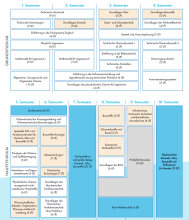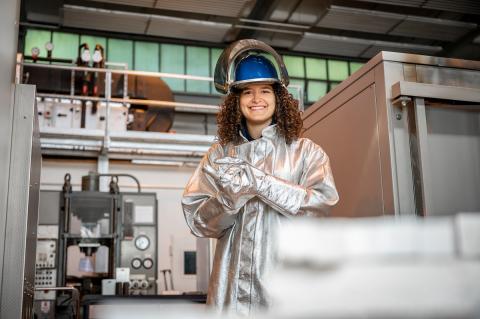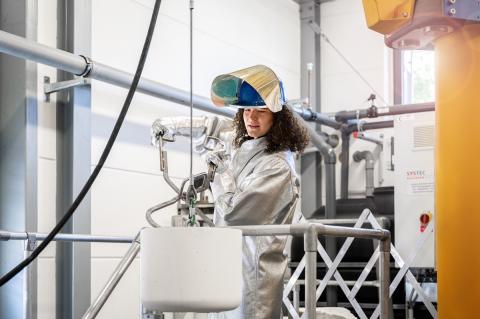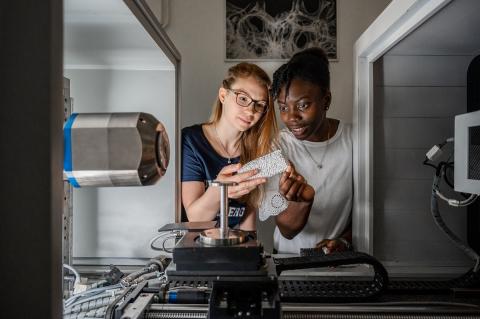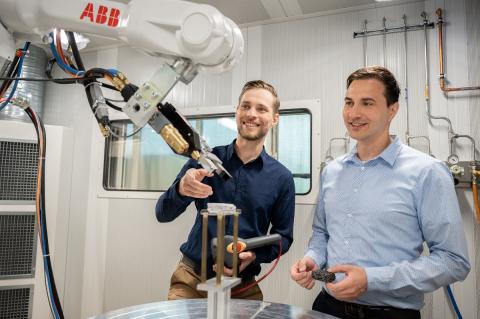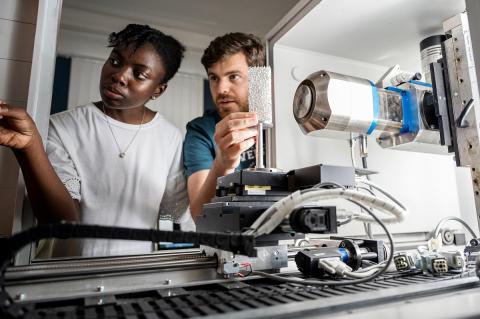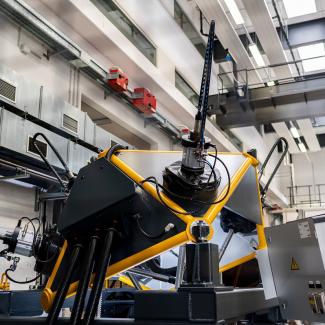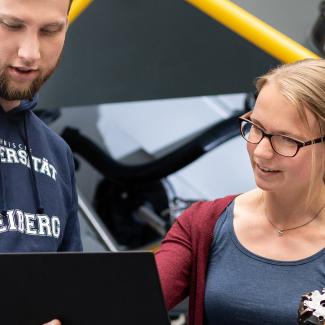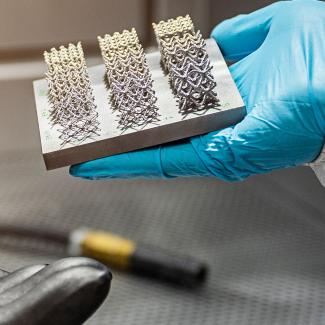Ceramics, glass and building materials technology
Innovative and creative! Engineers on the course conduct research into future materials for industry
From glass fibres and heat-insulating building materials to heat shields for space technology - rarely does an industry offer such an interesting field as ceramics, glass and building materials. This is where classic applications such as porcelain, container glass and bricks meet high-tech developments such as solar modules, diesel soot filters and fibre concretes. During production, from the raw material to the finished product, there are numerous tasks that need to be solved using interdisciplinary expertise. Knowledge of raw materials and their properties, processes and systems of the various technologies, the wide range of materials, testing and analysis methods are taught as well as aspects of environmental protection, marketing, quality assurance and technical language training.
Ceramics, Glass and Building Materials Technology is an engineering degree programme with a focus on process engineering. It covers the production of ceramics, glass and building materials in all process stages, from the raw material to the highly refined product, as well as the application of these products in a wide variety of areas and the recycling of the products at the highest possible level. The versatility of this degree programme also makes it possible to pursue individual interests, develop one's own strengths and acquire specialist knowledge in individual areas. In addition to a broad, interdisciplinary engineering and scientific basis, the degree programme includes specialist training in processes, methods and systems for ceramics, glass, enamel and building materials from the raw material to the end product, including questions of materials testing and analysis.
Practical skills are particularly important. Internships in various laboratories at the institute serve this purpose. The specialist internship in the 7th semester is an important part of the degree programme. Production technologies and production facilities in ceramics, glass and building materials companies are presented during specialised excursions. The professors maintain numerous contacts with companies and partner universities in Europe, Asia and America for partial studies abroad.
- Faculty
-
Faculty of Mechanical, Process and Energy Engineering (Faculty 4)
- Degree
-
Diploma (Dipl.-Ing.)
- Standard period of study
-
10 Semester
- Part-time possible
-
No
- Start of studies
-
Winter semester
- Admission requirement
-
Abitur or subject-specific higher education entrance qualification or an entrance qualification recognized as equivalent
Language requirement
- Application: with at least B1 level German
- Admission to the degree program: with C1 level German (e.g. DSH-2)
- language courses and DSH exam at TUBAF
- Course language
-
German
- Process and plant engineering: e.g. in plant management, technology, division or department management
- Research and development: e.g. Companies with their own research department, research institutes, universities
- Quality assurance: e.g. company laboratories, production monitoring
- Material testing and failure analysis: e.g. material testing institutes, company laboratories
Why study Ceramics, Glass and Building Materials Engineering at TUBAF?
The unique Ceramics, Glass and Building Materials Engineering degree programme at TU Bergakademie Freiberg provides you with interdisciplinary expertise that offers excellent career opportunities. Relevant companies near and far are constantly looking for graduates of this degree programme! Materials of the future are an exciting field of activity.
The TU Bergakademie Freiberg is a campus university of short distances with personal contact to lecturers who are well networked (possibility of scholarships, collaboration on current research projects even as a student, support for semesters abroad).
The city of Freiberg scores with a low cost of living, affordable and sufficient living space and an active student life.
Information on further study programmes at TUBAF
The diploma programme is a five-year undergraduate degree course, after which graduates are qualified to do a doctorate.
Interests and skills you should bring with you
- You are curious about materials for the future
- You have a basic understanding of chemistry and physics (no advanced course level required)
- You are enthusiastic about the further development of technologies
A 6-week basic internship (30 working days) is required for this degree programme. Completion or partial completion before the degree programme (after the Abitur) is recommended. The internship can also be completed during the degree programme. Requirements for the basic internship can be found HERE. Dr Dög will be happy to answer any questions (see blue box on the right for contact details).
What alumni say
"It's not just life around the campus that's great, but also the personal contact with lecturers and professors that characterises Freiberg. Short distances from the university buildings to the cafeteria and library are also an advantage :-) And student life is not neglected while studying. The proximity to Dresden and Chemnitz is also an advantage."
